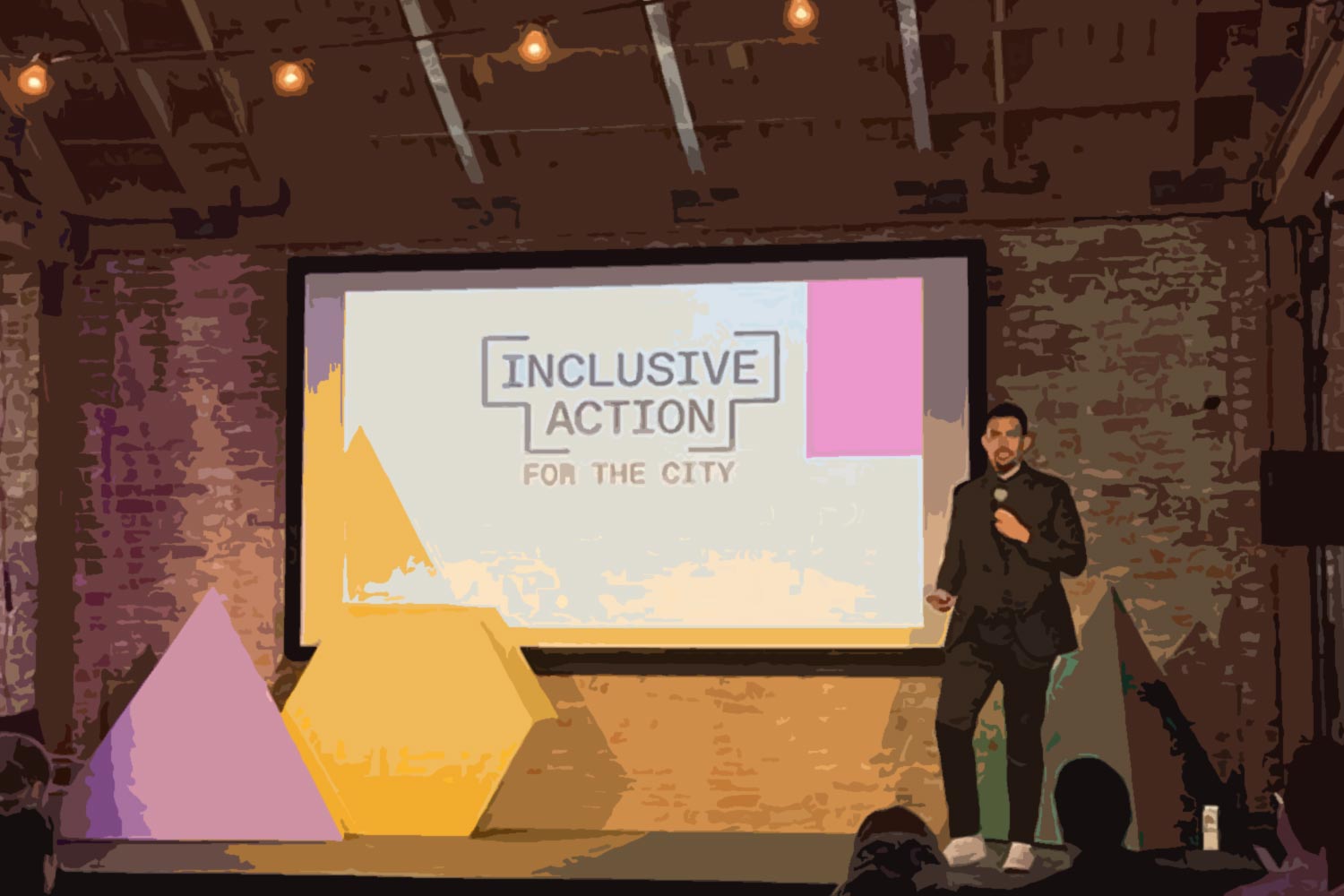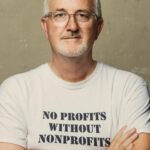Against the Current: Rudy Espinoza’s Request to President-elect Biden
Interview with Rudy Espinoza, Executive Director at Inclusive Action for the City (IAC) in Los Angeles.

“I want to be able to say that I helped build up a new generation of leaders who transformed the systems we inherited.”
When I arrived in LA, I was told by many people that I had to meet Rudy Espinoza. They were right. Rudy is one of the most respected, tireless, and up-front leaders I’ve ever met. More importantly for me, he’s focused on the economics of poverty. I think you’ll dig his mission and drive, and I hope you’ll consider replicating some of his ideas in your town.
What’s your thing… not what you do, but why you do what you do?
I consider my work to be about addressing income inequality, and I think the conviction for my work comes from two emotions:
The first is anger. I’m pissed that in Los Angeles, Black and brown households have about 1% of the net worth of white households. This is not an accident either. It’s brought to us by decades of intentional policies that subjugated whole communities. I’m angry about this.
But I’m also in love! I’m in love with working class families who inspire with their resiliency and refusal to give up in the face of every adversity.
They don’t quit! I work for them.
OK, now tell us what you do.
I serve as the Executive Director of Inclusive Action for the City, a nonprofit that focuses on building strong local economies through policy advocacy and economic development initiatives that support low-income families and entrepreneurs.
Inclusive Action is a CDFI (Community Development Financial Institution), so a significant part of our work involves getting capital into the hands of people who don’t have access to it otherwise. We offer low-interest loans paired with technical assistance for entrepreneurs like street vendors and others who are rejected by major institutions. But what makes us special, I think, is that we believe that finance must be done alongside advocacy work.
To this end, we were one of the founders of the LA Street Vendor Campaign, a coalition of organizations that worked for years to legalize street vending in Los Angeles. We got it done in 2018 after nearly 10 years of work, and we’re now working to make sure it’s implemented equitably.
Capital must be paired with advocacy!
As a young leader, what makes you want to scream most about the state of philanthropy? What gives you the most hope for our sector?
At Inclusive Action, we often talk about working ourselves out of a job. We’re here because there are some issues we want to address; we want to put everything on the line to get it done, and then we’d like to move on to other things. As a leader, we don’t want to be part of an “industry,” we want to be part of a movement.
I don’t think philanthropy is in this place. Much of philanthropy is more interested in preserving itself than doing everything it can to solve the crises in our communities.
But what gives me hope are the leaders of color who are rising in the ranks of philanthropy and who see this as problematic. They are advancing ideas around spending down their endowments, investing in community organizing, stepping out as advocates, and even mobilizing their board, donors, and investors to think differently about how investments can support people, not profits.
If you could get the ear of President-elect Biden, what law or policy would you most urge him to enact, and how would it radically rock your world?
Cancel the rent.
The Covid-19 pandemic has exacerbated the economic issues that communities of color have been facing for a very long time. Some of our clients are months behind in the rent, and property owners are struggling too. How can they pay their own mortgages when their tenants have no income?
Deferring rent will not save us from the mounting debt that will face us when this pandemic is over. Many will never be able to recover.
The role of government is to fix market failures. The role of policymakers is to intervene when something is not working or when one particular group is getting hurt more than others. I think we need to take a serious look at federal policy that “recasts” debt. This will likely involve major legislation that brings financial institutions to the table.
“Cancelling” the rent could be a major adrenaline shot into our economy, especially in low-income communities. It will help everyone, not just those who are behind.
How much money would you need to truly run wild and what would it allow you to do?
Only $100 million. A seed investment into a revolutionary investment fund to preserve small business corridors who are being rocked by market speculation.
What was the last code word, bizsplaining moment, or condescending comment you got from an elder, and what did you say, or wish you could have said to push back?
Elders have been pretty cool with me to date. J A couple of times I’ve had some haters speak up when I’ve shared data on the racial wealth gap, but that was more fragility than condescension.
Talk about your best elder ally and how they inspired you through their actions
It’s hard for me to pick the “best,” but I’ve been really lucky to have had a chance to work with and gather advice from a lot of people over the years. I’m constantly in search of advice from folks. Whenever I get a chance, I try to slip in questions to people I admire during a meeting etc. (like Kobe did with Michael!)
I’ve loved being in touch with people like Benny Torres (CD Tech) and Michael Banner (LA LDC) who keep it real with me and remind me of the marathon we’re in. I’m eternally grateful to some of my early mentors like Elwood Hopkins who really encouraged me to be authentic in my work and bring in my unique perspective to traditional spaces.
Many talk about diversity in the sector or the lack of it. How do you and your org walk the walk?
Inclusive Action is a team entirely made up of people of color. But we still have a lot of work to do. We’ve begun examining our workflows to diversify our client base (which is mostly Latino) so we can consider how we can better serve the Black community in our city. We’ve also begun sharing information on combating anti-Black racism through our Street Vendor Emergency Fund. Every time a street vendor receives cash assistance during this pandemic, we are also sharing information on how anti-Blackness harms all of us.
Tell us about another young leader everyone should know about?
It’s been really cool to see leaders like Eunisses Hernandez from La Defensa do her work. She’s a powerful person in Los Angeles who has been working alongside many important leaders to fight for alternatives to incarceration. With Justice LA, she helped stop jail expansion, and recently she helped pass Measure J, an important piece of legislation that will guarantee at least 10% of our County budget dollars for community services instead of police.
What do you want to be able to say about yourself and your leadership in 20 years?
I want to be able to say that I helped build up a new generation of leaders who transformed the systems we inherited.
You might also like:
- Is There An Inequality Tipping Point for Nonprofits?
- Using Philanthropy to Address Racial Harm and Inequity
- Beyond the Hype: Why ESG Frameworks Miss the Mark for Small Nonprofits
- How Nonprofits Can Benefit from Embracing ESG Practices
- ESG is Everywhere. Should It Matter to Nonprofits?
You made it to the end! Please share this article!
Let’s help other nonprofit leaders succeed! Consider sharing this article with your friends and colleagues via email or social media.
About the Author
Articles on Blue Avocado do not provide legal representation or legal advice and should not be used as a substitute for advice or legal counsel. Blue Avocado provides space for the nonprofit sector to express new ideas. The opinions and views expressed in this article are solely those of the authors. They do not purport to reflect or imply the opinions or views of Blue Avocado, its publisher, or affiliated organizations. Blue Avocado, its publisher, and affiliated organizations are not liable for website visitors’ use of the content on Blue Avocado nor for visitors’ decisions about using the Blue Avocado website.









Hello Rudy Espinoza;
You are doing amazing work but I have one question about canceling rent. Yes something needs to be done to help people pay their rent but what about landlords that maybe have 1 small apartment building. They want to help their tenants and at same time it could be their only income source. They still have to pay maintenance and utility bills. The cares act may have helped some but not all. While I am not in this group of people fortunately, It has become an issue for many.
Hi Leslie, I agree with you 100%. There are many people who may own a small building who are directly impacted when their tenants cant pay their rent. Without rent, they may not be able to pay their mortgage. A growing chorus of advocates are saying that in addition to “cancel rent” we must also “cancel mortgages.” If we don’t have a plan in place to support tenants and property owners, I think there will be mass displacement because so many will never be able to catch up on their unpaid debt. Let’s hope the new administration considers this!